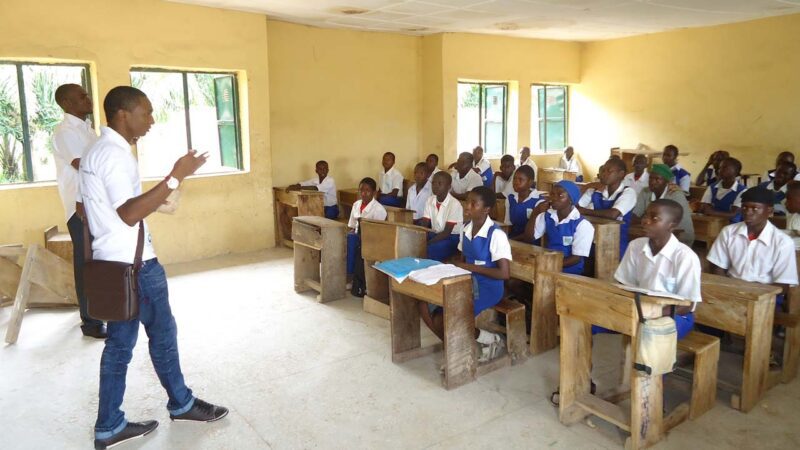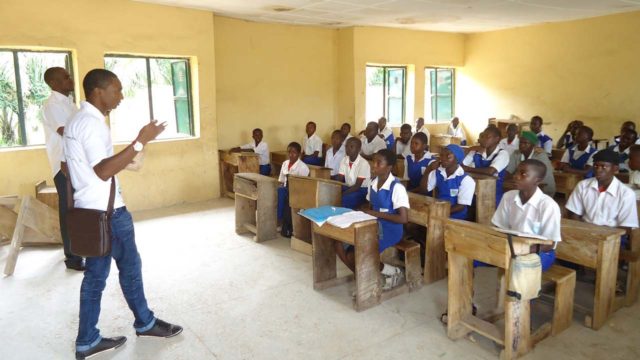Educational Issues
Nigeria’s Outdated Curriculum Against The 21st Century -By Kareem Itunu Azeez

Away from Africa, to the Asian Continent, Japan precisely, it’s been recorded that this Asian heavyweight now train it’s Young talents, towards job that are yet to come into existence, towards employability in a world where unemployment seems to be taking a geometrical progression against the backdrop of heavy joblessness.
Flipping through the education system in Nigeria, particularly even as a student teacher, under some disgusting and uncomfortable situation, I feel more depressed, as everyday from time immemorial there seems to be little or no review to the school curriculum we have, prior to the 2014 curriculum, I mean the Introduction of the B.E.C, By 2008, the federal government through the National Education Research Development Council, NERDC, introduced the Universal Basic Education Curriculum.
This curriculum separated the school curriculum into two namely the Basic Education Curriculum (BEC) and the Senior Secondary School Curriculum.

The BEC comprises Lower Basic (Primary 1-3), Middle Basic (4-6) and Upper Basic (JSS 1-3) while the senior secondary is made up of SS 1-3 left to stand alone.
The new BEC forms a nine-year curriculum with each category offering 10-16 subjects. Although this system is still the 6334 model in practice, it is difficult to categorise as secondary or primary because the first nine years of studies combines primary education with junior secondary education.
As a result, it caused a lot of confusion because more subjects were added which added to the workload of both teachers and students. This led to the revision of this curriculum in 2014, this only implies how a somewhat confuse people we seem to be, while all this processes are not necessary in shaping the frame of mind of the young adults, Nigeria education sector still looks blind to understand this.
While the 2014, in theory was created to arm students for self development and entrepreneurship skills, in theory, it’s effect is still negatively documented, as more students were unable to scale through examinations, due to this excessive workload, the revised curriculum of 2014 states that, due to complaints by parents and staff alike on the overload of subjects.
This made NERDC to merge some subjects that had the same theme for instance Agriculture and Economics were merged to form Pre-vocational studies, Christian Religious Studies, Civic Education, Social Studies and Islamic Religious Studies were merged into Religion and National Values.
This resulted in every of the categories of the 9-year curriculum offering a maximum of 10 subjects. Under the 2014 revised curriculum, pupils in primary 1-3 are now to offer a minimum of seven subjects and a maximum of eight, primary 4-6 are to offer minimum of 8 and maximum of 9 while JSS 1-3 is to offer minimum of 9 and maximum of 10 subjects. Even more confusing calendar for the students, instead of been direct Nigeria system rather bombard the students with subjects irrelevant to their field or walks in life.
Japan for example as I emphasised, In Japanese schools, the students don’t take any exams until they reach grade four (the age of 10). They just take small tests. It is believed that the goal for the first 3 years of school is not to judge the child’s knowledge or learning, but to establish good manners and to develop their character. Children are taught to respect other people and to be gentle to animals and nature. They also learn how to be generous, compassionate, and empathetic. Besides this, the kids are taught qualities like grit, self-control, and justice.
Add this along, while it is good for the sake of employing those who might not have the qualifications needed for gainful pathways to life, in Japan most schools do not employ cleaners the student do this chores even to college levels.
While in Nigeria, our mathematics topics have been the same for God knows how long, even our English language, we keep searching for the missing x, while our counterparts, already are doing something with the X, they found. Exams are repeated, ceaselesly almost all years, and the syllabus is never improved, and even when it’s revised it carries nothing new, how then do we compete with the outside world, and education they say, is what keeps a country afloat during the storms.
Two years ago, Crawford University (Igbesa) vice chancellor once expressed his dismay about the curricula in Nigeria, “Many of the curricula were developed over 20 years ago and they are kind of subject-oriented curricula. The kind of curriculum we need is more of functional one which talks about entrepreneurship rather than white-collar job,” unfortunately, even till this moment they remain the same or rather outdated changes are still been made. Changes long overdue.
According to a research conducted, few years ago, by Bonaire Arrivals and departures, about countries with reasonable standard of education, East Asian nations continue to outperform others. South Korea tops the rankings, followed by Japan (2nd), Singapore (3rd) and Hong Kong (4th). All these countries’ education systems prize effort above inherited ‘smartness’, have clear learning outcomes and goalposts, and have a strong culture of accountability and engagement among a broad community of stakeholders.
Scandinavian countries, traditionally strong performers, are showing signs of loosing their edge. Finland, the 2012 Index leader, has fallen to 5th place; and Sweden is down from 21st to 24th.
Notable improvements include Israel (up 12 places to 17th), Russia (up 7 places to 13th) and Poland (up four places to 10th).
Developing countries populate the lower half of the Index, with Indonesia again ranking last of the 40 nations covered, preceded by Mexico (39th) and Brazil (38th
Nigerian students from the lower cadre are left with another hurdle of developing themselves, since yet again the country has failed us, as usual, particularly the old ones who enjoyed a stellar educational system during their times. Self education is all that we can do, to remain competitive and qualified among our fellow international peers, if we must maintain the gift of intellectual curiosity, which added to our been the giant of Africa, for now all we must do is to look outside the outdated curriculum, and think outside the box.
Azeez writes from Lagos State University, a campus journalist.
08134249115
Ikareemazeez@yahoo.com



















